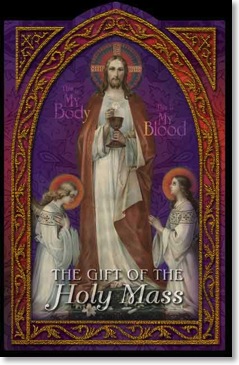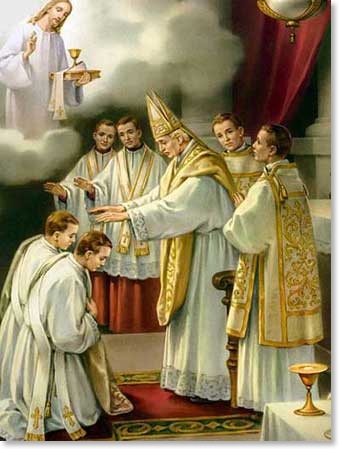
Catholic Prayer Revival
The Holy Mass




Why go to Mass?

Order of the Mass

Prayer before Mass

Prayer after Communion

Prayers after Mass
Why go to Mass?
"The Mass is the most perfect form of prayer!"
(Pope Paul VI)
For each Mass we attend with devotion, Our Lord sends a saint to comfort us at death.
(Revelation of Christ to St. Gertrude the Great)
Padre Pio, the stigmatic priest, said, "The world could exist more easily without the sun than without the Mass."
The Curé d'Ars, St. Jean Vianney, said, "If we knew the value of the Mass, we would die of joy."
Once, St. Teresa was overwhelmed with God's goodness and asked Our lord, "How can I thank you?" Our lord replied, "Attend one Mass."
Apologetics of the Mass
Catholics re-sacrifice Christ in their Mass? Catholics do not re-sacrifice Christ in the Mass! As stated in Hebrew 7:27, Christ has been sacrificed once for our sins. Catholics do not re-sacrifice Christ. Catholics merely do as Christ commanded in Luke 22:19, "This is my body which is given for you, do this in remembrance of me." The sacrifice of the Mass, is a remembrance of the sacrifice of Jesus (not a reenactment-it is a remembrance)
In Fr. Mitch Pacwa's audio tape IS THE MASS A SACRIFICE?, he explains how that in the Jewish custom, lambs were slaughtered in Passover sacrifice. At the time that Jesus died (3:00 PM) in the afternoon, it was the exact moment (as was Jewish tradition), that the lambs were being slaughtered in the Temple by the High Priests for the Passover sacrifice. Fr. Pacwa continues by stating that in John 1:29; John the Baptizer states: "Behold the Lamb of God, which taketh away the sin of the world." The mass is a remembrance, and the sacrifice is Jesus who delivered us from death to life. Fr. Pacwa explains that the Passover that Jesus and the Disciples shared at the last supper was the traditional Jewish Passover until the 4th cup of wine. This is where Jesus changes the Passover meal by breaking bread and drinking the wine with his apostles. Fr. Pacwa shows in the Bible verses below show how Jesus states that his blood, his death is the early sacrifice of the Mass:
(1 Cor 11:23-25) St. Paul states- For I have received of the Lord that which also I delivered unto you, That the Lord Jesus the same night in which he was betrayed took bread: And when he had given thanks, he brake it, and said, Take, eat: this is my body, which is broken for you: this do in remembrance of me. After the same manner also he took the cup, when he had supped, saying, This cup is the new testament in my blood: this do ye, as oft as ye drink it, in remembrance of me. For as often as ye eat this bread, and drink this cup, ye do shew (declare) the Lord's death till he come ( when he comes the second time). So until Jesus comes again, we are to remember his sacrifice and do as Jesus commands.
(Lk. 22:18-20) - And he took bread, and gave thanks, and brake it, and gave unto them, saying. This is my body which is given for you: this do in remembrance of me. Likewise also the cup after supper saying, This cup is the new testament in my blood, which is shed for you.
(Mt. 26:26-28) - And as they were eating, Jesus took bread, and blessed it, and brake it, and gave it to the disciples, and said, Take, eat; this is my body. And he took the cup, and gave thanks, and gave it to the disciples, and said, Drink ye all of it; For this is my blood of the new testament, which is shed for many for the remission of sins. But I say unto you, I will not drink henceforth of this fruit of the vine, until that day when I drink it new with you in my Father's kingdom.
NOTE: if you attend a Catholic Mass you will see what Christ truly instituted, straight from the Gospel!
Vatican II identifies the Mass as follows: "At the Last Supper, on the night He was betrayed, our Savior instituted the Eucharistic Sacrifice of His Body and Blood. He did this in order to perpetuate the sacrifice of the Cross throughout the centuries until he should come again, and so to entrust to His beloved spouse, the Church, a memorial of His death and resurrection: a sacrament of love, a sign of unity, a bond of charity, a paschal banquet in which Christ is consumed, the mind is filled with grace, and a pledge of future glory is given to us. (Sacrosanctum Concilium)"
The Catholic Mass centers around the Eucharist; the bread that becomes Jesus on the altar and the wine that becomes His blood. When the priest places his hands over the bread and wine, He summons the Holy Spirit to make them Holy and make these gifts into the flesh and blood of Jesus.
How can bread and wine become the flesh and blood of Jesus? Let us look at John 6:52-55, the Jews had a hard time believing Jesus' words as do non-Catholics.
(John 6:52-55) - The Jews therefore strove among themselves, saying, How can this man give us his flesh to eat? Then Jesus said unto them, verily, verily, I say unto you, Except ye eat the flesh of the Son of man, and drink his blood, ye have no life in you. Whoso eateth my flesh, and drinketh my blood, hath eternal life; and I will raise him up at the last day. For my flesh is meat indeed, and my blood is drink indeed.
(John 6:58), Jesus explains the importance of this bread, that He states that it is truly Himself. "This is that bread which came down from heaven; not as your fathers did eat manna and are dead: he that eateth of this bread shall live for ever." (This bread that Jesus speaks of, is the food that will give life)
In John 6:66 many of Jesus' disciples left Jesus because they could not believe in His words. Then Jesus says to His twelve apostles in John 6:67 "Will ye also go away?" It is clear what Jesus is stating, He does not take back His words and He does not say that it is another parable. He gives His apostles the opportunity to leave. Then Peter Simon, speaking for the 12 states in John 6:68, "Lord, to whom shall we go? Thou hast the words of eternal life.
Non-Catholics believe that John 6:53 is merely a symbol and not the actual presence of Christ. If Jesus were truly a symbol, then verse 27 through 29 in 1 Cor. 11 would not make sense. In this verse Paul states:
(1 Cor. 11:27-29) "Wherefore whosoever shall eat this bread, and drink this cup of the Lord, unworthily, shall be guilty of the body and blood of the Lord." But let a man examine himself, and so let him eat of that bread, and drink of that cup. For he that eateth and drinketh unworthily, eateth and drinketh damnation to himself, not discerning the Lord's body.
Why do Catholics kneel and stand? The reason that we kneel is that we truly believe that when the priest makes holy, the bread and wine, we know that we are in the presence of our Lord. As it states in Romans 14:11, "As I live, saith the Lord, every knee shall bow to me." Catholics bow before Him, just as if we were at His throne in Heaven.
The Customs of the Mass are strange. The Catholic Mass has too many unknown and strange rituals. To a non-Catholic, the Mass seems to be a strange set of behaviors and actions. If you examine these behaviors and actions and compare them to the Bible you will find that the Catholic Church is the only church on earth that institutes what the Bible truly teaches. My questions to a non-Catholic would be: Does your church have priests and bishops? Does you church use incense? Do your ministers dress as the priests in the Bible? Does your church anoint the sick with oils?
Let us examine some of the so-called "strange" customs of the Catholic Church. A few examples of Bible verses supporting bishops, priests and deacons, incense, garment worn by priests, and holy oils.
BISHOPS
(1 Tim 3:1) If a man desire the office of a bishop, he desireth a good work.
(1 Titus 1:7) For a Bishop must be blameless, as the steward of God; not self-willed, not soon angry, not given to wine, no striker, not given to filthy lucre.
PRIESTHOOD
(Heb 7:5) And verily they that are of the sons of Levi, who receive the office of Priesthood, have a commandment to take tithes of the people according to the law, that is, of their brethren, though they come out of the loins of Abraham.
(Heb 7:12) For the priesthood being changed, there is made of necessity a change of the law.
DEACONS
(1 Tim 3:10) And let these also first be proved; then let them use the office of a deacon, being found blameless.
INCENSE
(Lk. 1:9) - According to the custom of the priest's office, his lot was to burn incense when he went into the temple of the Lord.
(Rev. 8:3) And another angel came and stood at the altar, having a golden censer; and there was given unto him much incense, that he should offer it with the prayers of tall saints upon the golden altar which was before the throne.
GARMENTS
(Ex. 28:4) - And these are the garments which they shall make; a breastplate and an ephod and a robe, and a broidered coat, a mitre, and a girdle and they shall make holy garments for Aaron thy brother and his sons, that he may minister unto me in the priest's office.
(Ex. 31:10) And the cloths of service, and the holy garments for Aaron the priest, and the garments of his sons, to minister in the priest's office.
HOLY OILS
(Ex. 31:11) And the anointing oil, and sweet incense for the holy place: according to all that I have commanded thee shall they do.
(James 5:14) Is any sick among you? Let him call for the elders of the church; and let them pray over him anointing him with oil in the name of the Lord.
Order of the Mass
Introductory Rites
- Entrance procession
- Greetings - "The Lord be with you."
- The Penitential Rite or Rite of Blessing and Sprinkling Holy Water
- Kyrie - "Lord have mercy"
- Gloria - "Glory in the highest"
- Opening Prayer - pray in silence
- The responsorial psalms are either read or sung between the readings.
- First reading - normally from the Old Testament
- Second reading - from the Epistles of the New Testament
- Third reading - from the Gospels.
- Homily (Sermon)
- Profession of Faith - The Creed
- General Intercessions and Prayer of the Faithful
- Preparation of the Gifts
- Lavabo - The Rite of Hand Washing
- Prayer Over the Gifts
- Eucharistic Prayer
- The Preface - "The Lord be with you [...]"
- The Sanctus
- Epiclesis - God is called on to transform the offering of bread and wine into the Body and Blood of Jesus Christ
- The Consecration - the elements are consecrated and transformed into the Body and Blood of Jesus Christ
- Transubstantiation - occurs after this "This is my body [...]" and "This is My blood [...]"
- Memorial Acclamation - Mystery of faith
- Remembrance
- Offering - calling on God to offer the sacrifice in union with all the sacrifices in the past
- Intercessions
- Final Doxology - "Through Him, with Him, in Him [...]"
- The Lord's Prayer
- Embolism - share the sign of peace among each other
- The Fraction - breaking of the bread
- The Commingling - when priest breaks the Bread he also drops a small piece of the Host into the Chalice
- Agnus Dei - "Lamb of God"
- Communion - "reception of the Sacrament of the Eucharist"
- Silence after Communion
- Prayer after Communion
- Announcements
- Greeting and Blessing
- Dismissal
Prayer before Mass
Eternal Father,
we humbly offer Thee our poor presence and that of the whole humanity from the beginning
to the end of the world at all the Masses that ever have or ever will be offered. We offer Thee
all the pains, sufferings, prayers, sacrifices, and joys of our lives, in union with those of our
dear Lord Jesus here on earth. May the Most precious Blood of Christ, all His blood and
wounds and agony save us, through the Sorrowful and Immaculate Heart of Mary.
Amen
Prayer after Communion
O Jesus,
I believe that Thou art truly present in the Blessed Sacrament. Although my eyes and
tongue tell me that I have received only bread, yet my faith tells me that I have received Thy
Body and Blood. I believe, Lord; help Thou my unbelief. I adore Thee as my God and my
Savior.
Amen
Anima Christi
Soul of Christ, sanctify me
Body of Christ, save me
Blood of Christ, inebriate me
Water from Christ's side, wash me
Passion of Christ, strengthen me
O good Jesus, hear me
Within Thy wounds hide me
Suffer me not to be separated from Thee
From the malicious enemy defend me
In the hour of my death call me
And bid me come unto Thee
That I may praise Thee with Thy saints
and with Thy angels
Forever and ever
Amen
Prayer Before a Crucifix
Behold, O kind and most sweet Jesus, I cast myself upon my knees in Thy sight, and with the most fervent desire of my soul I pray and beseech Thee that Thou would impress upon my heart lively sentiments of faith, hope, and love, with true repentance for my sins, and firm desire of amendment, while with deep affection and grief of soul I ponder within myself, and mentally contemplate Thy five most precious wounds; having before my eyes that which David spoke in prophecy; They pierced my hands and my feet; they have numbered all my bones.
The Highest Plenary indulgence, may be gained by all the faithful, who, after having confessed their sins with contrition, received the Holy Communion, and prayed for the Sovereign Pontiff, shall devoutly recite this prayer before an image of representation of the Christ crucified, after Communion: (S. Paen. A.p.m 2 Feb. 1934)









